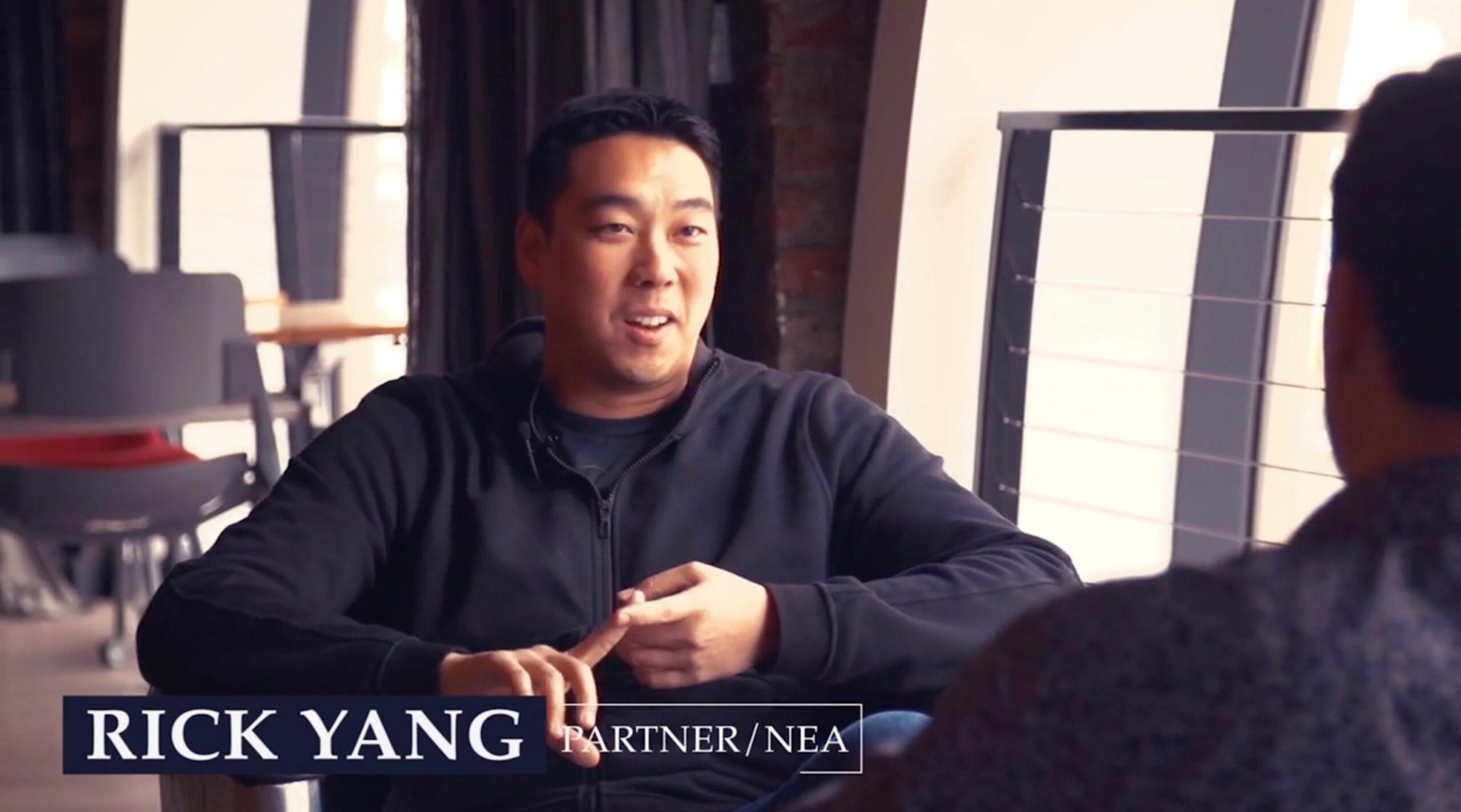

In our new series, “How It’s Built”, we uncover the thinking behind moves in the startup world. Today we’re featuring a conversation between Rick Yang (NEA) and James Currier (NFX) about their recent $15.5 million series A investment in Lyric (co-founders Andrew Kitchell and Joe Fraiman).
Notes from NFX
Financings are important milestones in the overall arc of the company building process. As Founders ourselves before NFX, we always wanted to get an inside view of how some of these VC financings actually went down. Now that we’re on the inside of many of them, we want to make the decision process more transparent, and share the learnings we get from the investments we make.
8 Lessons Founders can learn from Lyric:
1. More often than not, disruption starts with data: We were impressed in 2015 that the Lyric team understood that building a unique set of market data would enable them to see things others do not, which in turn allowed them to create a business others could not. This is a lesson you will hear also from our Partner Pete Flint — that data network effects were one of the key defensibilities when he built another real estate company, Trulia.
2. Domain expertise can be overrated: Investors often shy away from a team that lacks domain expertise. Contrary to convention, we believe that outsiders with the right combination of aptitudes and something to prove can beat insider teams. For instance, Lyric started with a high quality team, but they were outsiders to the real estate industry. However, they were strong on data analytics and software, at a time when those areas of expertise were growing in importance yet widely lacking.
3. Big Market moving fast: The home stay market is $100B, growing 30% per year, and the hospitality industry is $1T. That kind of size and speed means multiple big opportunities will shake out. It’s the kind of fertile soil Founders should seek.
4. In fluid markets, the winners maintain flexible thinking: In a fluid market like homestays where the power dynamics change every year, how you navigate — or “how you fly the plane” — is critical. It requires a level of thoughtfulness and fluidity from the team and its board that most startups lack. You have to foster that thinking by promoting trust and clear communication.
5. Large multi-tenating markets yield opportunities for startups: If the market you’re looking at still allows multi-tenanting by both the supply and demand sides, like AirBNB/HomeAway/Booking.com does, it opens interesting startup opportunities. While multi-tenanting can be a sign of weaker network effects if you’re the incumbent, it’s also an indication that current market leaders have yet to truly win. These are often the most fertile places to enter and get a hold, and build your own network effects.
6. “Software Plus”: Increasingly, we are observing that software alone doesn’t always move the market the way it did 1994–2013. Today, you often need “software plus” something else. In Lyric’s case, their “plus” is to take control of the real estate and manage it. In 2015 that was a contrarian bet. Managing atoms and software is not as scalable as just managing software. However, it now means Lyric can deliver a great customer experience and capture the economics.
7. Founder commitment to go for a Big Outcome: During our initial conversations with Lyric, they were also receiving some aggressive M&A talks in the low double-digit millions. As a Founder, I know exactly how this feels — someone is offering to put a few million dollars in your pocket. Imagine how hard that is to turn down. But that is what commitment to a big outcome requires — risking losing a small outcome in pursuit of building a real company. It’s not right for everyone — in fact, its not right for most people. But Lyric demonstrated they wanted that path. It was right for who they are as people. That’s what this is all about.
8. Big outcomes require great culture and operations: When you go into the Lyric offices, you can feel the culture, you can watch the operational mindset. It’s cool. And it’s necessary to have a shot at building a big company. We see that playing out even more now as the company grows.
__________________________________________________________________________
Video Transcript — Rich Yang (NEA) in conversation with James Currier (NFX)
“Seeing the differences in the different founders within the company, yet how they complimented each other in the business was really important to us.”
— Rick Yang, NEA
James (Currier): Rick, you’ve just led the $22 million series A investment in Lyric, which is a short-term stay leader managing real estate all around the U.S. I’d love to hear directly from you why you guys did the deal. What were you thinking?
Rick (Yang): You said yes and (invested) two years before we did. I’d love to hear your perspective…What did you see in Lyric even two years before (us)?
James: We met them in April 2015 and what we saw initially of course was this fire in their eyes and a little bit of desperation. And I like that in founders — I certainly had it myself when I was doing my four companies, so that was the first thing. The second thing was we saw a lot of data they were collecting from these homestay platforms that nobody else seemed to have. And so we saw the forming of a data network effect. And potentially a two-sided platform network effect that they could get later — that’s still in the process of forming, but we saw the potential. The third thing was just the size of the market — this is a crazy market, $100 Billion and growing 30% a year. When you have a market that big and fast, you typically see a lot of things dropping out of it or just shaking loose. So it seemed like fertile soil. Plus, I just wanted to spend more time with the Lyric team. They were good folks. And so that was the initial thing.
Rick: What’d you have to get over to actually…say yes?
James: So it turns out that they were about three days away from going out of business (when we invested). They were right on the edge when we put in our $100k check initially. But then really what we had to get over was these pretty aggressive early-stage M&A talks that were pushed on them — low double-digit millions where they could have sold and made a few million dollars each pretty quickly. They had to really think that through and decide if they wanted to go for it, whether they really wanted to build a big company or not. It took about five or six weeks. We got through it and they decided to go for it. But that was two years ago. Now — you guys have a $3.3 Billion fund, which I think is the largest fund ever for a venture firm. You guys have a lot going on, you can invest in nearly any company you want. And what I’ve known about you over the years is just how accessible you are — I don’t how you do it with all that you’ve got going on at NEA, frankly. You’ve invested in things like Opendoor and MasterClass and Plaid. Big companies like that. What did you see? I mean, it’s been two years, but was what was going on there?
Rick: (First), Seeing the differences in the different founders within the company, yet how they complimented each other in the business was really important to us. And then that balance between coach-ability yet having the self-awareness to know that they didn’t know everything. (Second), The lyric team saw a gap in the market and they were addressing it in a very, very compelling way and that really aligned with us. We bought into the story, we bought into all the different things they were doing on the software and data side that you really couldn’t do before. (Third),…processing all this data that was out there. As you mentioned, we’re investing out of a $3.3B fund. What that means is any given company that we invest in has to have the potential and opportunity to be a needle mover. And a needle mover for a $3.3B fund is a very big number.
James: …but what gave you pause? What did you have to get over to (make the investment)?
Rick: You know, when you have such a big market, and such a dynamic market, other people are looking at the same thing too. And so from the outside, a lot of people have this idea and are trying to execute on what we call super hosts — building out this short term rental inventory, managing it, packaging up for consumers. We had to really dig in under the hood to understand what were the unique insights, what were the unique capabilities, what are the unique thoughts that these founders were having to address this market in a different way. And what we found is — it’s a very difficult business. There’s a lot that goes into it. The fact is that (Lyric was) building software that not a lot of people were building — it’s not just real estate, but it’s also the data piece that you really have to understand. It took us a couple of months to really dig in, to really feel good that this was the team we wanted to back, this was the approach we wanted to back, and we thought Lyric were going to be the winners.
James: And it would be defensible, because it’s actually hard to do. And it wasn’t clear from the outset that that was true, but how long did it take you to figure that out?
Rick: It took us a couple months. I would say it was a good month of diligence after getting to know these founders for two and a half years.
James: It’s great to hear (the reasons for investing) directly from you.
As Founders ourselves, we respect your time. That’s why we built BriefLink, a new software tool that minimizes the upfront time of getting the VC meeting. Simply tell us about your company in 9 easy questions, and you’ll hear from us if it’s a fit.
